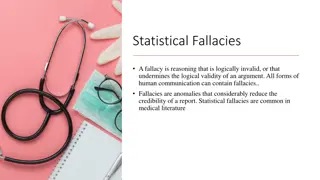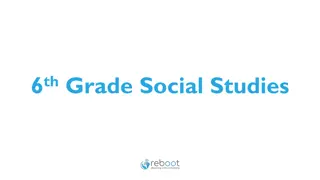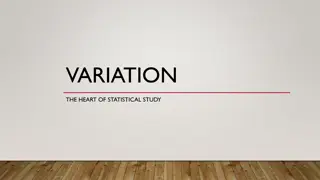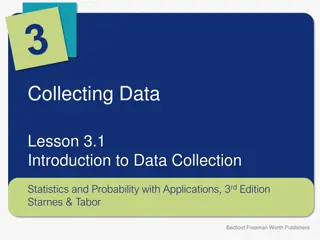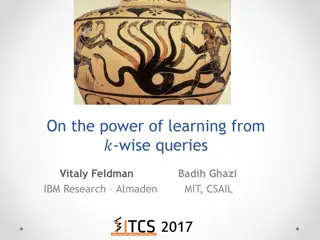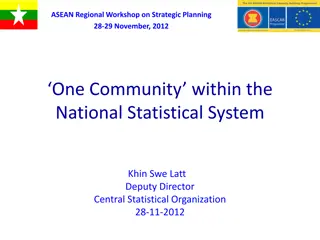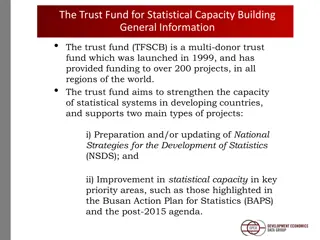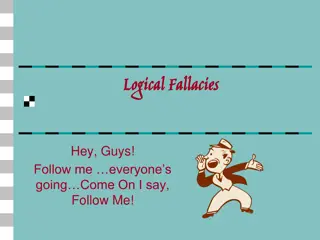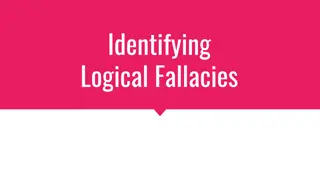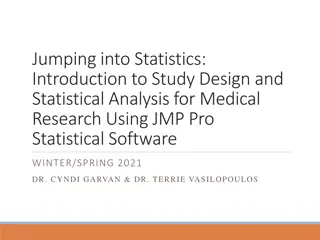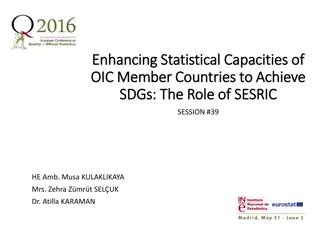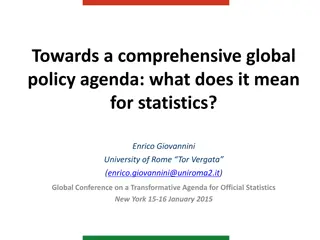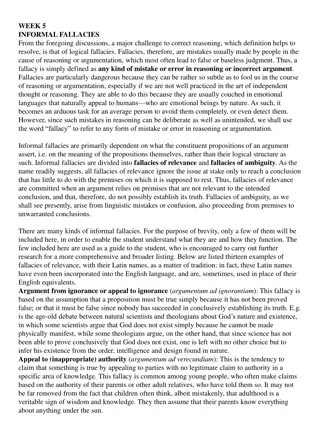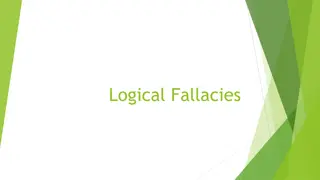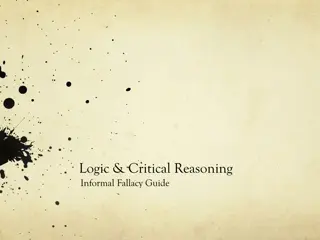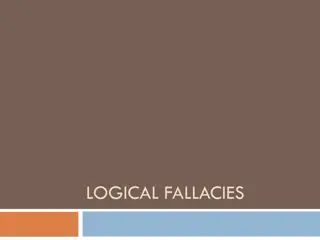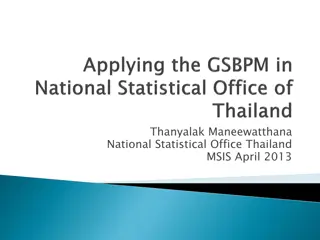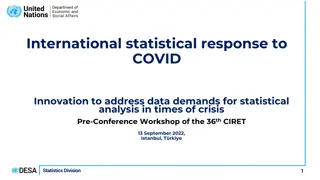Identifying Logical Fallacies: Understanding Poor Reasoning
Logical fallacies are errors in reasoning that can occur in formal or informal arguments. Examples include appeals to authority, appeal to the majority, appeal to pity, and appeal to force. Understanding these fallacies can help in recognizing and avoiding flawed arguments.
5 views • 22 slides
Avoiding Statistical Fallacies in Medical Literature
Statistical fallacies, which can significantly reduce the credibility of reports, are common in medical literature. These fallacies often arise from issues with sample problems, inadequate analysis techniques, errors in presentation of findings, and misinterpretation of statistical results. Maintain
4 views • 7 slides
Fallacies in 6th Grade Social Studies
Explore the world of fallacies in 6th Grade Social Studies through examples and activities. Learn about biases, experimenter bias, confirmation bias, correlation vs. causation, random chance, lack of control group, and overgeneralization. Engage in group activities to identify and discuss different
3 views • 8 slides
Variation in Statistical Studies
Variability is key in statistical studies, shaping the essence of statistical analysis. Students often struggle to grasp the concept of variability, despite being taught statistical methods. The term "variation" takes on different meanings in various statistical contexts, presenting challenges in co
12 views • 54 slides
Introduction to Data Collection & Statistics: Understanding Statistical Questions, Population, and Sampling
This material introduces the fundamental concepts of data collection and statistics. Learning objectives include distinguishing statistical questions, identifying populations and samples, and understanding the difference between observational studies and experiments. It discusses the process of stat
5 views • 14 slides
Logical Fallacies in The Crucible: Act 1 & 2
The Crucible's Acts 1 and 2 are analyzed for logical fallacies including Hasty Generalization, Either/Or Fallacy, and False Cause among others. Key quotes and character interactions demonstrate flawed reasoning in the play's narrative.
6 views • 13 slides
Exploring the Power of Wise Queries in Statistical Learning
Dive into the world of statistical learning with a focus on the impact of wise queries. Discover how statistical problems are approached, the significance of statistical queries, and the comparisons between wise and unary queries. Explore the implications for PAC learning and uncover key insights in
7 views • 8 slides
IBM SPSS for Statistical Analysis
IBM SPSS, formerly known as Statistical Package for the Social Sciences, is a powerful software package for statistical analysis used by researchers across various industries. Developed in the late 1960s, SPSS offers features for data management, statistical analysis, and data documentation. It simp
13 views • 13 slides
Overview of Myanmar Statistical System and Central Statistical Organization
The Myanmar Statistical System operates as a decentralized system with the Central Statistical Organization playing a crucial role at the national level. Various surveys and data collection efforts are undertaken by different ministries and agencies, coordinated by the CSO. The CSO compiles and pres
3 views • 18 slides
The Trust Fund for Statistical Capacity Building
The Trust Fund for Statistical Capacity Building (TFSCB) is a multi-donor trust fund launched in 1999, supporting over 200 projects worldwide to strengthen statistical systems in developing countries. It focuses on national strategy development and improving statistical capacity in key priority area
6 views • 5 slides
Fallacies in Argumentative Techniques
Dive into the world of fallacies in argumentation, exploring the nuances of Ethos, Pathos, Logos, and various rhetorical devices. Uncover the pitfalls of faulty Ethos and Pathos, dissecting examples such as Poisoning the Well and Appeal to Pity. Enhance your critical thinking skills by recognizing a
5 views • 16 slides
Logical Fallacies and Persuasion Techniques
Learn about logical fallacies, persuasive writing, propaganda, and types of fallacies with examples like circular reasoning and false causality. Recognize how persuasive texts aim to influence readers and the importance of critical thinking when encountering different argumentative strategies.
3 views • 31 slides
Identifying Logical Fallacies in Sources: Presentation Assignment
Learn to identify logical fallacies in various sources by analyzing passages and applying the Logical Fallacy Referee tool. Work in pairs to select sources, identify fallacies, and present annotated examples to the class.
0 views • 7 slides
Jumping into Statistics: Study Design & Statistical Analysis in Medical Research
Explore the fundamentals of study design & research methodology, learn to select appropriate statistical tests, and practice statistical analysis using JMP Pro Software. Topics include research question formulation, statistical methods, regression, survival analysis, data visualization, and more. Un
1 views • 31 slides
Enhancing Statistical Capacities of OIC Member Countries to Achieve SDGs: The Role of SESRIC
This presentation discusses the importance of enhancing statistical capacities in OIC member countries to achieve Sustainable Development Goals (SDGs), with a focus on the role of SESRIC. It covers the evolution of statistical definitions, the use of Statistical Capacity Index (SCI) for analysis, an
15 views • 17 slides
Enhancing Global Statistical Systems for Sustainable Development
The post-2015 development agenda emphasizes the need for a comprehensive global policy agenda, impacting statistical systems worldwide. This agenda seeks to improve data collection, coordinate international statistical efforts, and enhance national statistical systems by 2020 to support the Sustaina
2 views • 23 slides
Informal Fallacies: Common Logical Errors in Reasoning
Informal fallacies are mistakes in reasoning or argumentation that can lead to false judgments. They can be subtle and appeal to emotions, making them challenging to avoid. Fallacies of relevance and ambiguity are common types. Examples include argument from ignorance, appeal to authority, and appea
1 views • 5 slides
Logical Fallacies: Spotting and Avoiding Faulty Reasoning
Explore various types of logical fallacies such as circular reasoning, either/or fallacy, oversimplification, overgeneralization, and stereotyping through real-life examples. Learn how to identify these flawed arguments to strengthen your writing and critical thinking skills.
2 views • 25 slides
Effective Strategies for Word Study in Text Analysis
Explore common fallacies in word study such as the English-Only Fallacy, Root Fallacy, Time-Frame Fallacy, and Over-load Fallacy. Learn how to overcome these fallacies by giving context priority and using concordances. Discover practical steps to choose words for study, including looking for critica
3 views • 7 slides
Rules and Fallacies in Valid Syllogisms
Valid syllogisms must adhere to specific rules to avoid committing formal fallacies. These rules include distribution, quality, and quantity concepts. Breaking these rules can lead to fallacies such as undistributed middle, illicit major, and illicit minor. Examples are provided to illustrate these
1 views • 18 slides
Logical Fallacies in Mathematics
Explore the concepts of logical fallacies in mathematics and learn how to recognize and analyze deceptive arguments. The session covers topics like proposition, negation, truth values, sets, Venn diagrams, and different types of arguments. Enhance your critical thinking skills and approach problems
2 views • 22 slides
Logical Fallacies and How to Address Them
Exploring logical fallacies through examples such as hasty generalization and oversimplification, learning to spot them in media and everyday arguments, and tips on addressing and avoiding fallacies in persuasive writing.
1 views • 7 slides
Logical Fallacies: Common Types and Examples
Logical fallacies are errors in reasoning that can undermine the validity of arguments. This content covers various types of fallacies such as circular logic, either/or fallacy, oversimplification, overgeneralization, stereotyping, and ad hominem attacks. Examples and explanations are provided for e
8 views • 16 slides
Mastering Logic & Critical Reasoning: Fallacy Guide
Evaluating arguments in critical thinking involves assessing logical form and identifying informal fallacies. Understanding argument structure, recognizing same form-different content scenarios, and detecting informal fallacies are key aspects of logical reasoning.
4 views • 48 slides
Statistical Tools for Method Validation in USP General Chapter 1210
In the USP General Chapter 1210, Statistical Tools for Method Validation are outlined, serving as a companion to the validation of Compendial Procedures. The chapter covers important topics like Accuracy, Precision, Linearity, LOD, LOQ, and range. It emphasizes statistical tools such as TOST, statis
1 views • 22 slides
LOGICAL FALLACIES
A logical fallacy is a deceptive or false argument that relies on bad logic. Learn about common fallacies like the False Comparison and Bad Example, and how to counter them effectively. Enhance your critical thinking skills and avoid falling for flawed reasoning in debates and discussions.
5 views • 22 slides
Analyzing Inductive Arguments & Fallacies
Inductive arguments present conclusions based on likelihood, which can be strong, weak, or in-between. Learn about fallacies in reasoning, both formal and informal, and ways to spot and address them effectively.
3 views • 17 slides
Identifying Fallacies - Analogies, Ad Hominem, Examples
Learn about weak analogies and ad hominem fallacies with examples. Understand how these fallacies affect arguments and reasoning. Explore insightful explanations and real-world instances to enhance your critical thinking skills.
1 views • 16 slides
4th Grade Math Fallacies and Bias
In this educational material, students will learn about identifying biases and fallacies in math examples through critical thinking. The content covers important concepts like correlation not implying causation, bias detection, and random chance. Students will explore real-world examples to understa
3 views • 14 slides
Statistical Business Processes and Models at NSO Thailand
The National Statistical Office of Thailand has been developing various statistical business processes and models, including the Generic Statistical Business Process Model and Draft Good Statistical Practice Guidelines. The agency is striving to align its operations with international standards like
8 views • 11 slides
Statistical Response to COVID-19 Innovation Addressing Data Demands
International statistical response to COVID-19 focused on addressing data demands for statistical analysis during times of crisis. The Global COVID-19 survey of NSOs highlighted the challenges and thematic areas covered. Decision 52/102 by the Statistical Commission emphasized the importance of moni
4 views • 19 slides
Distributed Systems: Principles and Challenges Unveiled
Explore the intricacies of distributed systems including paradigms, goals, transparency, fallacies, and heterogeneity. Understand the complexities and advantages of scalable, reliable, and collaborative distributed systems despite inherent challenges such as network fallacies and system heterogeneit
1 views • 53 slides
Statistical Ensemble in Statistical Physics
This chapter explains the fundamental concept of statistical ensemble in statistical physics, emphasizing the analysis of an ensemble of identical macroscopic systems to understand macroscopic values. It explores the construction of representing statistical ensembles based on macrostates defined by
0 views • 31 slides
Understanding Logical Fallacies and Statistics in Argumentation
Explore the concept of logical fallacies, their deceptive nature, and how to identify and address them in arguments. Learn about the importance of using statistics and logical reasoning to support claims effectively. Be vigilant in spotting fallacies in media and advertisements to become a savvy rea
3 views • 19 slides
Understanding Logical Fallacies and Annotated Bibliographies
Explore the concept of logical fallacies and annotated bibliographies, learn how to identify and avoid fallacies in arguments, and understand the importance of annotating sources in academic research. Discover the significance of critical thinking and proper citation practices in forming well-suppor
3 views • 21 slides
Word Study Fallacies and Tips for Effective Word Analysis
Learn about common fallacies in word study like English-Only Fallacy and Root Fallacy, along with practical tips for choosing words to study effectively. Explore how to avoid Time-Frame Fallacy and Over-load Fallacy in word analysis. Discover methods to deepen understanding through context and histo
0 views • 7 slides
Understanding Fallacies in Argumentation
Explore the concept of fallacies in argumentation not as mere errors to avoid, but as tools for evaluating the strength of reasoning and evidence. Learn how fallacies are not distinct forms but rather involve degrees, interpretations, and context, impacting the persuasiveness of arguments. Delve int
0 views • 13 slides
Politics and Logical Fallacies: Debunking Common Misconceptions
Explore how politics often sidesteps logical debates by employing common fallacies such as ad hominem attacks, straw man arguments, black-and-white fallacies, hasty generalizations, and false dilemmas. Understand the implications of these flawed reasoning tactics in political discourse.
1 views • 12 slides
Avoiding Logical Fallacies in Thinking
Learn how logical fallacies can impact thinking skills, such as mistaking correlation for causation, engaging in ad hominem attacks, making false analogies, hasty generalizations, either/or reasoning, and appeals to popularity or tradition. Understanding these fallacies helps in critical thinking an
0 views • 13 slides
Understanding Argumentation Types and Fallacies
Explore Richard Weaver's argument types that delve into unchanging qualities and essences, along with powerful symbols termed Ultimate Terms. Discover various argumentative fallacies that hinder reasoning and delve into different methodologies of constructing and deconstructing arguments.
0 views • 11 slides

